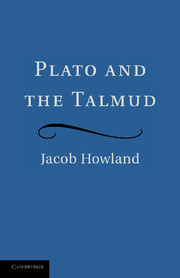Book contents
- Frontmatter
- Contents
- Acknowledgments
- Introduction: Athens and Jerusalem
- 1 Talmudic and Platonic Writing
- 2 Rabbis and Holy Men
- 3 Prophets and Philosophers
- 4 Fathers and Sons
- 5 Words and Deeds
- 6 Gods and Men
- 7 Miracles and Necessity
- Epilogue: Texts and Traditions
- Works Cited
- Index to Biblical and Rabbinic Texts
- General Index
6 - Gods and Men
Published online by Cambridge University Press: 10 November 2010
- Frontmatter
- Contents
- Acknowledgments
- Introduction: Athens and Jerusalem
- 1 Talmudic and Platonic Writing
- 2 Rabbis and Holy Men
- 3 Prophets and Philosophers
- 4 Fathers and Sons
- 5 Words and Deeds
- 6 Gods and Men
- 7 Miracles and Necessity
- Epilogue: Texts and Traditions
- Works Cited
- Index to Biblical and Rabbinic Texts
- General Index
Summary
In at least one respect, Ta'anit 3 is perfectly consistent with the whole of which it is but a small part: the Talmud repeatedly and continually asks readers to reflect on how they might best embody God's teaching in the Torah. The Talmud is able to frame the question of the best life in just this way because it can legitimately assume that readers are already united in the worship of the God of Israel, acknowledge the Torah as an essential and unique body of divine instruction for human life, and have at least a rudimentary appreciation of the subtlety and complexity of this instruction.
In the context of the Platonic dialogues, no comparable assumptions are possible. The inquiry of the Euthyphro is consequently much broader and more rudimentary than that of Ta'anit. Its central questions have to do with who the gods are, and what they want from us. Are the gods selfish beings driven by violent passions, or are they guardians of justice? Do the gods demand unquestioning devotion, or do they encourage and reward critical reflection on the meaning of their communications to human beings? The dialogue poses these questions not because the Greek religious tradition fails to answer them, but because the answers it offers are not consistent. Those who explicitly claim knowledge of piety are therefore necessarily engaged in the activity of interpretation, even though they may not be fully conscious of the nature of this activity.
- Type
- Chapter
- Information
- Plato and the Talmud , pp. 188 - 221Publisher: Cambridge University PressPrint publication year: 2010



